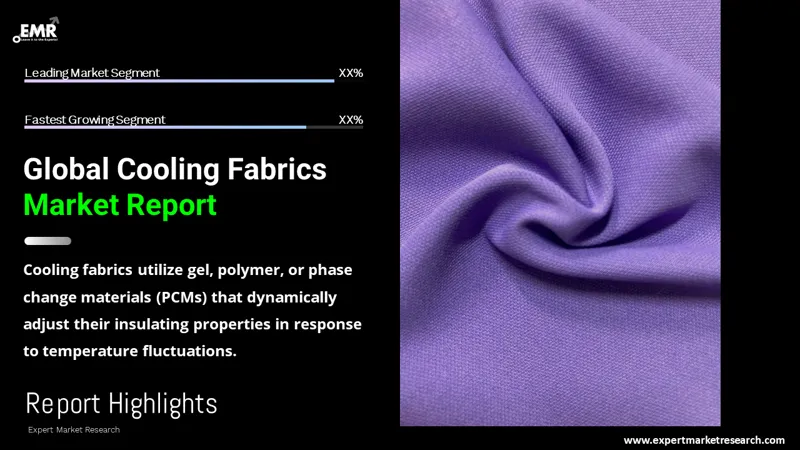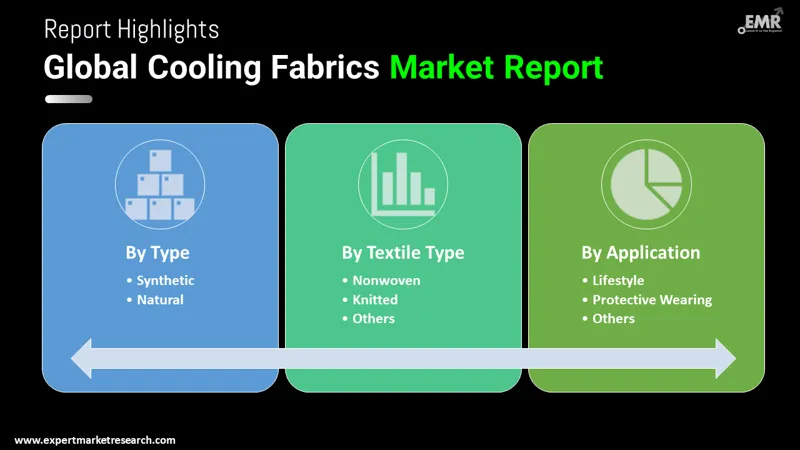
Consumer Insights
Uncover trends and behaviors shaping consumer choices today
Procurement Insights
Optimize your sourcing strategy with key market data
Industry Stats
Stay ahead with the latest trends and market analysis.
The global cooling fabrics market size attained a value of approximately USD 2.81 Billion in 2025. The market is further expected to grow in the forecast period of 2026-2035 at a CAGR of 8.00%, reaching a value of around USD 6.07 Billion by 2035.
Base Year
Historical Period
Forecast Period
Compound Annual Growth Rate
8%
Value in USD Billion
2026-2035
*this image is indicative*
The increasing demand for cooling fabrics in summer, in the form of t-shirts, shorts, and shirts, among others, to bolster the comfort of people living in humid, temperate, and areas near to equator, is driving the cooling fabrics market growth. Summer clothing incorporated with cooling fabrics, such as summer cotton fabric, cool linen, flowing silk, and bamboo fabric, among others, are witnessing a heightened demand among youngsters. Increasing sale of summer collections via e-commerce sales channels, is also adding to the market revenue for cooling fabrics. Moreover, changing consumer preferences towards more breathable, printable, and stylish clothing products is likely to aid the market for cooling fabrics over the forecast period.

Read more about this report - REQUEST FREE SAMPLE COPY IN PDF
North America holds a major share of the global market for cooling fabrics, supported by new technological advancements, research and development investments, and the presence of an established consumer base. Within North America, United States accounts for a healthy share of the market while Canada covers the second-largest share after the United States. The well-developed sports industry in the United States is further propelling the market for cooling fabrics. The increased demand for these fabrics for military applications is expected to further strengthen the market for cooling fabrics in this region. The cooling fabrics market in North America is predicted to develop in response to the rising demand for cooling fabrics in the industrial sector. Rising disposable income of consumers and high level of promotions by market players in the region are expected to further augment the dynamics of the market for cooling fabrics.

Read more about this report - REQUEST FREE SAMPLE COPY IN PDF
Cooling fabrics are made out of gel, polymer, or phase change materials (PCMs) that vary their insulating qualities as the temperature changes. These textiles work by absorbing heat and moisture and releasing it into the atmosphere, which helps to increase the breathability and ventilation of the fabrics. They also help to maintain a comfortable body temperature during physical activity and improve general well-being in hot weather. Cooling fabrics are commonly used to make sportswear all over the world due to their superior thermal conductivity and tactile qualities.
The cooling fabrics market segmentation by type is:
Based on textile type, the market is divided into:
On the basis of application, the market is categorised into:
The regional markets for cooling fabrics are divided into:
Rising need for protective apparel and sportswear is projected to propel the cooling fabrics market growth. Increasing engagement in sports and regular exercise due to increasing health awareness is driving demand for cooling fabrics-based sportswear, which is expected to drive the global market forward in the long run. Growing adoption of cooling materials in the industrial and military sectors is another factor expected to generate cooling fabrics market revenue.
Cooling fabrics aid in sweat evaporation and offer protection against pollution and UV rays. The increasing popularity of cooling fibres due to their properties is also fuelling the growth of the market for cooling fabrics. The creation of low-cost cooling fabrics and promotional operations that use commercials and social media to raise awareness can help players in the market earn more money. In addition, the introduction of new, advanced, and higher-quality cooling fabrics is likely to boost the global market's growth. Increasing technological advancements and investments in research and development are expected to expand the market share of cooling fabrics in the global fashion and clothing sector in the coming years.
The report gives a detailed analysis of the following key players in the global market for cooling fabrics, covering their competitive landscape, capacity, and latest developments like mergers, acquisitions, and investments, expansions of capacity, and plant turnarounds:
The comprehensive EMR report provides an in-depth assessment of the market based on the Porter's five forces model along with giving a SWOT analysis.




*While we strive to always give you current and accurate information, the numbers depicted on the website are indicative and may differ from the actual numbers in the main report. At Expert Market Research, we aim to bring you the latest insights and trends in the market. Using our analyses and forecasts, stakeholders can understand the market dynamics, navigate challenges, and capitalize on opportunities to make data-driven strategic decisions.*
Get in touch with us for a customized solution tailored to your unique requirements and save upto 35%!
In 2025, the global market for cooling fabrics attained a value of approximately USD 2.81 Billion.
The market is projected to grow at a CAGR of 8.00% between 2026 and 2035.
The market is estimated to witness a healthy growth in the forecast period of 2026-2035, reaching a value of around USD 6.07 Billion by 2035.
The major drivers of the market include increasing health awareness, growing adoption for cooling materials in industrial and military sectors, and introduction of new, advanced, and higher quality cooling fabrics.
Promotional operations, increasing technological advancements, rising investments in research and development, increasing demand for protective apparel and sportswear, and growing engagement in sports and regular exercise are the key market trends.
The major regions in the market are North America, Latin America, the Middle East and Africa, Europe, and the Asia Pacific.
The primary types of colling fabrics in the market are synthetic and natural.
The various textile types in the market for cooling fabrics include woven, nonwoven, and knitted, among others.
The leading applications of cooling fabrics in the market are sports apparel, lifestyle, and protective wearing, among others.
The major players in the market are Ahlstrom-Munksjö, Polartec®, LLC, Coolcore, Formosa Taffeta Co., Ltd., HexArmor, HeiQ Materials AG, Asahi Kasei Corporation, Libolon, Nan Ya Plastics Corporation, and Nilit Ltd, among others.
Explore our key highlights of the report and gain a concise overview of key findings, trends, and actionable insights that will empower your strategic decisions.
| REPORT FEATURES | DETAILS |
| Base Year | 2025 |
| Historical Period | 2019-2025 |
| Forecast Period | 2026-2035 |
| Scope of the Report |
Historical and Forecast Trends, Industry Drivers and Constraints, Historical and Forecast Market Analysis by Segment:
|
| Breakup by Type |
|
| Breakup by Textile Type |
|
| Breakup by Application |
|
| Breakup by Region |
|
| Market Dynamics |
|
| Competitive Landscape |
|
| Companies Covered |
|
Datasheet
One User
USD 2,499
USD 2,249
tax inclusive*
Single User License
One User
USD 3,999
USD 3,599
tax inclusive*
Five User License
Five User
USD 4,999
USD 4,249
tax inclusive*
Corporate License
Unlimited Users
USD 5,999
USD 5,099
tax inclusive*
*Please note that the prices mentioned below are starting prices for each bundle type. Kindly contact our team for further details.*
Flash Bundle
Small Business Bundle
Growth Bundle
Enterprise Bundle
*Please note that the prices mentioned below are starting prices for each bundle type. Kindly contact our team for further details.*
Flash Bundle
Number of Reports: 3
20%
tax inclusive*
Small Business Bundle
Number of Reports: 5
25%
tax inclusive*
Growth Bundle
Number of Reports: 8
30%
tax inclusive*
Enterprise Bundle
Number of Reports: 10
35%
tax inclusive*
How To Order

Select License Type
Choose the right license for your needs and access rights.

Click on ‘Buy Now’
Add the report to your cart with one click and proceed to register.

Select Mode of Payment
Choose a payment option for a secure checkout. You will be redirected accordingly.
Strategic Solutions for Informed Decision-Making
Gain insights to stay ahead and seize opportunities.

Get insights & trends for a competitive edge.

Track prices with detailed trend reports.

Analyse trade data for supply chain insights.

Leverage cost reports for smart savings

Enhance supply chain with partnerships.

Connect For More Information
Our expert team of analysts will offer full support and resolve any queries regarding the report, before and after the purchase.
Our expert team of analysts will offer full support and resolve any queries regarding the report, before and after the purchase.
We employ meticulous research methods, blending advanced analytics and expert insights to deliver accurate, actionable industry intelligence, staying ahead of competitors.
Our skilled analysts offer unparalleled competitive advantage with detailed insights on current and emerging markets, ensuring your strategic edge.
We offer an in-depth yet simplified presentation of industry insights and analysis to meet your specific requirements effectively.
Share